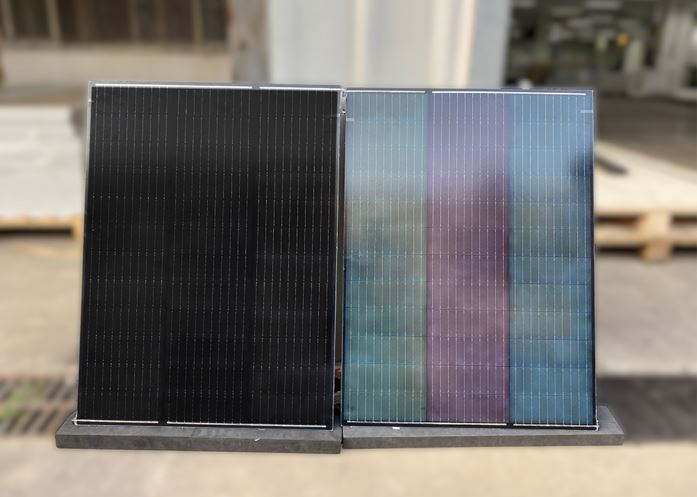Coloured PV modules are considered ideal for facade applications, as they are more visible than rooftops. However, their widespread application has been held back by the lack of a PV colourisation technology that has a low impact on power conversion efficiency (PCE) and is simultaneously mass-producible at a low cost.
To address this challenge, researchers at Shanghai Jiao Tong University have created solar panels that take on colourful hues while producing energy nearly as efficiently as traditional ones. They implemented a colorization strategy based on photonic glass, which was made of a thin, disorderly layer of dielectric microscopic zinc sulfide spheres.
By a fast spray-coating process, they showed that the photonic glass layer could be easily deposited on silicon solar cells, enabling them to have structural colours. Through varying microsphere sizes, solar cells with different colours were achieved, showing low PCE loss compared to normal black cells.
Using this approach, the researchers created solar panels that took on blue, green, and purple hues while only dropping the efficiency of power generation from 22.6% to 21.5%. Moreover, the long-term stability was subsequently verified by aging tests including an outdoor exposure for 10 days and a damp-heat test for 1000 h and the mass producibility is demonstrated by presenting a coloured PV panel with an output power over 108 W.
The researchers now plan to explore ways to make the colours more saturated, as well as methods to achieve a wider range of colours. They reported their findings in High-Efficiency, Mass-Producible, and Coloured Solar Photovoltaics Enabled by Self-Assembled Photonic Glass which was recently published in ACS Publications.
This content is protected by copyright and may not be reused. If you want to cooperate with us and would like to reuse some of our content, please contact: editors@pv-magazine.com.









By submitting this form you agree to pv magazine using your data for the purposes of publishing your comment.
Your personal data will only be disclosed or otherwise transmitted to third parties for the purposes of spam filtering or if this is necessary for technical maintenance of the website. Any other transfer to third parties will not take place unless this is justified on the basis of applicable data protection regulations or if pv magazine is legally obliged to do so.
You may revoke this consent at any time with effect for the future, in which case your personal data will be deleted immediately. Otherwise, your data will be deleted if pv magazine has processed your request or the purpose of data storage is fulfilled.
Further information on data privacy can be found in our Data Protection Policy.